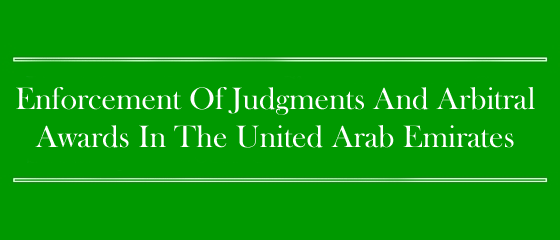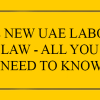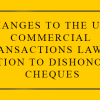Introduction
The article highlights and outlines the recognition and Enforcement Of Judgments And Arbitral Awards In The United Arab Emirates The article focuses on the legislative framework and procedure for enforcement of judgments and awards in detail. Specific advice must be obtained from a qualified UAE lawyer or a UAE Law Firm.
Legislative Framework and Enforcement of domestic Judgments by Onshore Courts
The independent definition of judgment is not provided under the UAE laws. For this purpose, under an execution writ, the performance of mandatory enforcement is must in fulfillment of a well-established right of known value and immediately due for payment according to Article 75 of The Executive Regulations. The legal framework followed by UAE courts and the federal courts are Federal Law No. 11 of 1992 on the Civil Procedure Code (Civil Procedure Code), and Section 3 of Cabinet Resolution No. 57 of 2018 Concerning the Executive Regulations of the Civil Procedure Code (Executive Regulations), as amended by Cabinet Resolution No. 33 of 2020. Article 192 of the Executive Regulations repeal and amend similar provisions of the Civil Procedure Code.
Matters dealt by Executive Regulations are as follows:
- The role of the execution judge and the enforcement officers (Articles 69 to 74, Executive Regulations).
- The form of the writ of execution (Articles 75 to 76, Executive Regulations).
- Immediate enforcement (Articles 77 to 84, Executive Regulations).
- Enforcement procedures (Articles 97 to 102, Executive Regulations).
Federal Law No. 10 of 2019 on Regulating Judicial Relations among the Judicial, Federal and Local Authorities (Judicial Relations Law) governs the enforcement of judgments between the courts of the different emirates. As per Article 10 of the Judicial Relations Law, all final or enforceable judgments or federal or emirate court’s orders are enforceable throughout the UAE, following the Civil Procedure Code and the Executive Regulations. It is to be noted that all domestic judgments are enforceable if enforcement requirements and the relevant procedures are followed.
After a final judgment is obtained the enforcement proceeding may be initiated with the help of UAE Law Firm. Such final judgment can be obtained from the court of first instance (not appealed), final judgment from Court of Cassation, and Court of Appeal. The claimant has the right to apply to the Execution Court seeking enforcement of the domestic judgment. The Court then opens a new case file having a different reference number than the main claim. As per Article 97, Executive Regulations, notice for payment of judgment sum is sent by the Court to the respondent within 15 days from date the Court notification (execution order) is received. The execution judge of the court who has issued the execution writ in the UAE has been granted jurisdiction over enforcement under Article 70(2) of Executive Regulations. Articles 77 to 84 provide immediate enforcement under UAE Civil Procedure Code. The judgment debtor has a liberty of filing a stay of execution in a case where execution would result in heavy damage as per Articles 83 and 84 of Executive Regulations. Enforcement forced measures can be imposed by the Court on the respondents on failure to comply with the execution order within a specified time. These measures include the issue of attachment orders on assets of respondents located in the UAE like bank accounts, stocks, shares, and bonds on tangible or real assets. The court while exercising its powers may impose a travel ban on the respondent. The court may order to block entire activities on the trade license of a company if the respondent is a company. The court can even order to freeze all the bank accounts of the company. It is to be understood that the enforcing court does not review the service of proceedings in a domestic judgment.
Necessary documents and information to be provided with an application for enforcement of Domestic Judgment by UAE onshore courts
- Writ of execution with the executory formula
- Duly notarized and legalized applicant’s power of attorney (POA) in favour of their legal representative
- Complete application form.
Other important aspects to be acknowledged regarding enforcement of domestic judgment
- Judgments have a conclusive effect and are final. It is interesting to know that UAE law recognizes the judgment of the Court of Appeal as a final judgment even if that judgment has been appealed before the Court of Cassation.
- A judgment creditor is legally entitled to receive legal interest as given by the judgment. The compound interest is generally not awarded or upheld in the UAE and Article 76 of Federal Law No. 18 of 1993 (Commercial Code) sets a limit of 12% at the interest.
- Pre-judgment remedies like interim measures are limited to precautionary attachments over specific assets given by the onshore UAE courts. Normally, UAE courts do not award specific performance and injunctive relief.
- A judgment issued by any of the UAE onshore courts can be enforced in the other emirate by the original execution judge. It can also be enforced by way of delegation of certain tasks to an execution judge in the other emirate as per Articles 70(3) and 71 of Executive Regulations.
Domestic Legislative Framework for Enforcement of foreign Judgment
The foreign judgments are enforced in the UAE irrespective of the reciprocal enforcement treaty was issued between the UAE and the country which issued the foreign judgment. Provisions of the treaty will apply if there is a treaty in place. In the absence of any treaty, the Code of Civil Procedure will apply accordingly (Article 235-238). The foreign judgments are categorized as per Article 85(1) of the Executive Regulations. For enforcement procedures in onshore courts, the judgments and orders issued by foreign states can be legally enforced and executed in the UAE. The foreign judgments in commercial matters that are excluded in onshore UAE are as follows:
- Default judgments
- Judgments made without notice (ex parte)
Article 85(2) of the Executive Regulations postulates that the foreign judgment or order must be enforced according to the standard litigation procedures in the UAE. It also sets various minimum requirements that are required to be met. These minimum requirements include that:
- The UAE courts do not exercise exclusive jurisdiction of subject matter of the judgment.
- The judgment does not oppose judgment, public order and morals of the UAE.
The execution court has the power to review the service of proceedings in a foreign judgment. Subject to review the service of proceedings, Article 85(2)(C) of the Executive Regulations provides that the court verifies the parties to the proceedings had been required to appear. Generally, the orders and judgments of the below-mentioned foreign jurisdictions are enforceable in UAE by following the relevant provisions of the treaty or convention. In the absence of a reciprocal enforcement treaty the conditions that need to be followed in UAE Civil Procedure Code are as follows:
- If the courts have exclusive jurisdiction under Article 85 of Cabinet Decision No. 57/2018, the courts only have power to refuse enforcement of foreign judgment.
- According to the laws of that state the jurisdiction was vested to the foreign court where the dispute was in question.
- The foreign court summoned all the parties to the dispute. Thereby, parties also appeared before the foreign court.
- The force of res judicata was given to the order or judgment by the court.
- The foreign judgment does not contradict with previous judgment/order and public order of the UAE Court.
International conventions and agreements on enforcement of foreign judgment
The UAE is a party to the various international conventions and bilateral treaties applicable to the enforcement of foreign judgments. Pan-regional conventions and treaties for enforcement of foreign judgments and the reciprocal recognition to which UAE is a party are mentioned below:
- Riyadh Arab Agreement for Judicial Cooperation 1983 (Riyadh Convention).
- Gulf Cooperation Council (GCC) Convention for the Execution of Judgments, Delegations and Judicial Notifications 1996
- Agreements with Pakistan, Tajikistan, India, Egypt, Armenia, Jordan, Azerbaijan, Morocco, Syria, Algeria, Somalia, China and France.
Also, other treaties of which the UAE is a party to are mentioned below:
- 1965 Convention on the Settlement of Investment Disputes between States and Nationals of Other States (ICSID).
- UN Convention on the Recognition and Enforcement of Foreign Arbitral Awards 1958 (New York Convention).
Procedure for Enforcement of Foreign Judgments in the UAE
An application must be made by the foreign judgment creditor/ applicant directly to the execution judge for the purpose of enforcing the judgment. The process of enforcement of a foreign judgment has now been changed by the new regulations. Before the new regulation came into effect, the same procedure had to be followed by the enforcing party as the party initiated fresh proceedings. The step was to file a recognition claim at the Court of First Instance, the judgment delivered by this court was appealed before Appeal Court and lastly was appealed before the Court of Cassation. The new regulation allows the application of enforcement to present directly before the Execution Judge. The Execution Judge without sending a notice to the defendant adjudicates the requirements of treaty or UAE Civil Procedure Code as per Article 85(2) of Cabinet Decision No. 2018. The information in the application form must be the same as the guide for the contents of the statement of claim. An order is required to be issued by the execution judge within three days after the enforcement application is submitted. Before issuing any order the Execution Judge may call for requisite documents for supporting the application that proves:
- Judgment is final
- Judgment is not subjected to any appeal
- Defendant was summoned and appeared in hearing
- The procedure of summon as to meet the legal requirements of foreign jurisdiction were judgment was given as well as criteria given under UAE Law.
It is pertinent to note that the applicant can apply for executory measures (like to secure the judgment debt executory attachment is claimed over the assets of respondent) if application seeking for enforcement is pending under Article 85 of the Executive Regulations.
The domestic legislative framework for the enforcement of arbitral awards
Article 41 of the Arbitration Law stipulates the form and contents of an arbitral award. For recognition of award, it must:
- Be in writing
- Be signed by the majority of all tribunal members
- Mention the grounds of the award (unless agreed otherwise by the parties, or where the applicable law does not mandate the grounds of the award be stated)
- Specify the names and addresses of the litigants
- Specify the names, addresses and nationalities of the arbitrators
- The arbitration agreement
- Summary of the relief sought by the litigants
- Summary of their documents, arguments and the operative text of the award. Its reasons must be specified (if applicable) along with date and place of issuance.
International Conventions and Agreements on Enforcement of Arbitral Awards in UAE
International Conventions and Agreements on Enforcement of Arbitral Awards to which the UAE is a party are already mentioned above. The same may also apply in the case of arbitral awards. Additionally, UAE is a party to the following treaties:
- 1965 Convention on the Settlement of Investment Disputes between States and Nationals of Other States (ICSID)
- UN Convention on the Recognition and Enforcement of Foreign Arbitral Awards 1958 (New York Convention)
The matters which are not arbitrable under UAE law are as follows:
-
- Personal matters (family)
- Criminal
- Disputes under registered commercial agency agreements
- Matters for which the law provides a specific penalty
1.Onshore enforcement of onshore seated awards (Domestic Awards)
The enforcement of arbitral awards seated onshore is governed by Articles 52 to 57 of Arbitration Law. The Judicial Relations Law deals with the enforcement of onshore seated arbitral awards by the onshore courts of another emirate. Article 11 provides that an arbitral award is enforceable in the other emirates laws in force in the UAE. Article 52 of the Arbitration Law provides that before enforcement; there must be prior approval of an arbitral award by the onshore UAE courts. An arbitral award under Article 52 has the force of res judicata and the same enforceability as if the judgment of the court provides that a decision of ratification of the award is obtained from the court. Article 55 provides that an application for ratification and enforcement must be submitted by an award creditor to the president of the federal or local court of appeal where the arbitral proceedings were conducted. It is to be noted that proceedings of enforcement do not institute at court of first instance level. Appeal for recognition/enforcement order of an award lies only from the Court of Appeal to the Court of Cassation. Article 54(2) provides that an appeal to the Court of Cassation shall be made within 30 days of the date instantly following notification of the Court of Appeal’s order. The ratification/ approval of the domestic award and enforcement order must be done within 60 days from the date the application has been filed for enforcement and recognition (subject to any proceedings of annulment).
Effect of Pending Challenge Proceedings to the Domestic Award (Onshore)
An action of annulment does not consequently result in a stay of the ratification and enforcement proceedings under Article 56 of the Arbitration Law. The court which examines proceedings of annulment can issue a stay order if there exist serious grounds in doing so (at the request of one of the parties). A stay must be decided by the court within 15 days from the first hearing date of proceedings. After a stay order is issued, a judgment subject to the annulment proceedings must be made within 60 days of the stay decision.
Grounds for Refusal of Enforcement of Domestic Award (Onshore)
Under an annulment action, the arbitral award can be challenged for refusal of an application for ratification and enforcement in Article 53(1) of the Arbitration Law. The grounds for refusal of enforcement subject to the New York Convention are:
- In absence of arbitration agreement or an agreement is forfeited or null and void according to the Arbitration Law.
- At the time of the conclusion of the arbitration agreement, the party was incapacitated according to the law governing its capacity.
- According to Article 4 of the Arbitration Law, the party was incapacitated to legally act concerning the disputed right.
- If the arbitral award deals with matters outside the ambit of the arbitration or not covered by the arbitration agreement. Here the decision will be deemed null and void on matters outside the scope of the arbitration.
2.Enforcement of foreign seated awards in UAE onshore courts (Foreign awards)
Article 85 of the Executive Regulations provides procedure for the enforcement of foreign arbitral awards. Article 85(2) lays down the procedure for the enforcement of foreign seated arbitral awards in the onshore courts, which is also applicable to the enforcement of foreign judgments. An additional requirement for enforcement of foreign arbitral award is imposed in Article 86 of the Executive Regulations is:
- The award must have been issued on a matter which is arbitrable in accordance with UAE law
- The award must be enforceable in the jurisdiction where it was issued.
Article 88 states that the Executive Regulations will not affect the provisions of treaties. This is worthy for enforcement of arbitral awards because the UAE has agreed to the New York Convention.
Effect of Pending Challenge Proceedings to the Foreign Award
Article 85 of the Executive Regulations also applies to foreign seated arbitral awards.
Grounds for refusal of Foreign Arbitral Award
Article 85(2)(A) of the Executive Regulations prescribes that onshore UAE courts examine the jurisdiction on the disputed matter on which the judgment was issued by the foreign court by complying with the international jurisdiction rules. The enforcement may be refused on jurisdictional grounds. If the court did not have the power to exercise exclusive jurisdiction over the dispute, the UAE court will look into the matter and may refuse the enforcement accordingly. The concept of “public order” is laid down in the UAE Civil Code. The definition is closely linked to the principles of Sharia. If the ground of public policy is applied for refusing enforcement of the foreign arbitral award, then this definition of local law may apply rather than a concept in international arbitration. No provision provides different public policy grounds between domestic and foreign awards. Enforcement is to be ordered only on verification that foreign judgment/ award in any way does not violate public order or morality in the UAE as per Article 85(2)(e) of the Executive Regulations.






